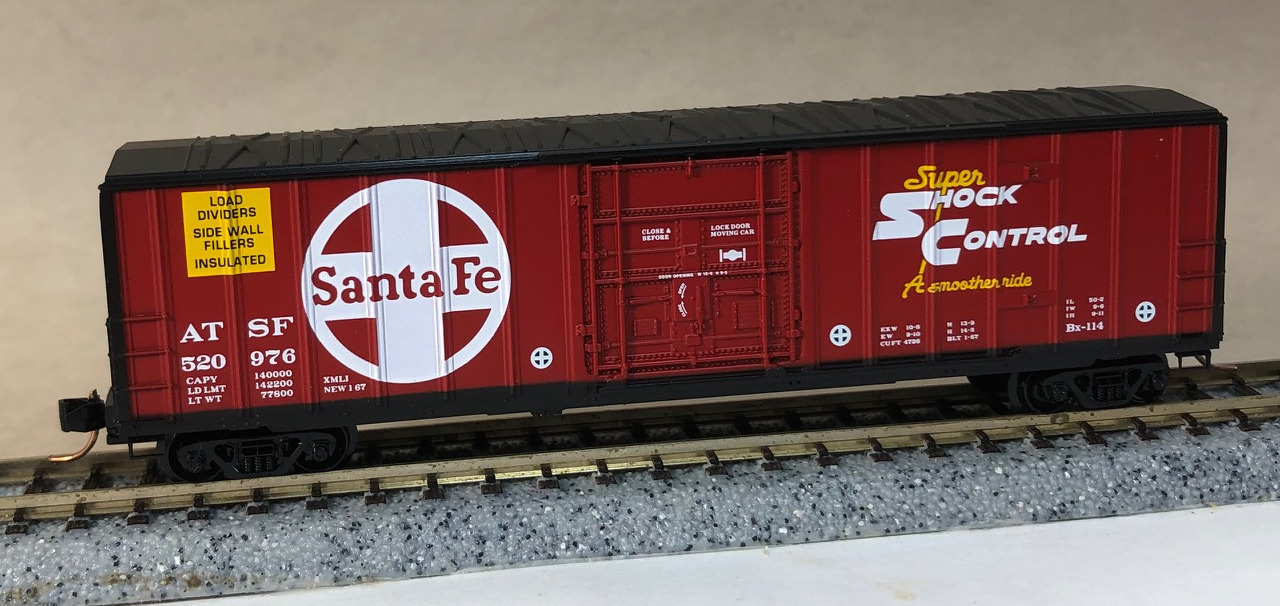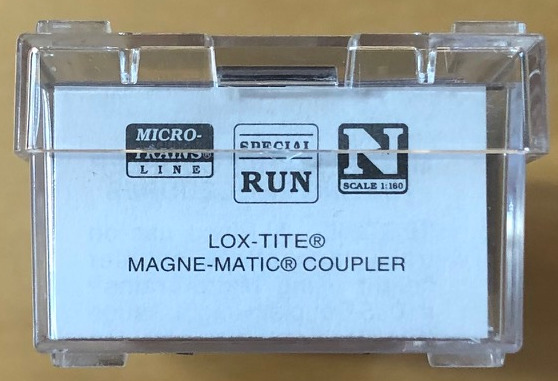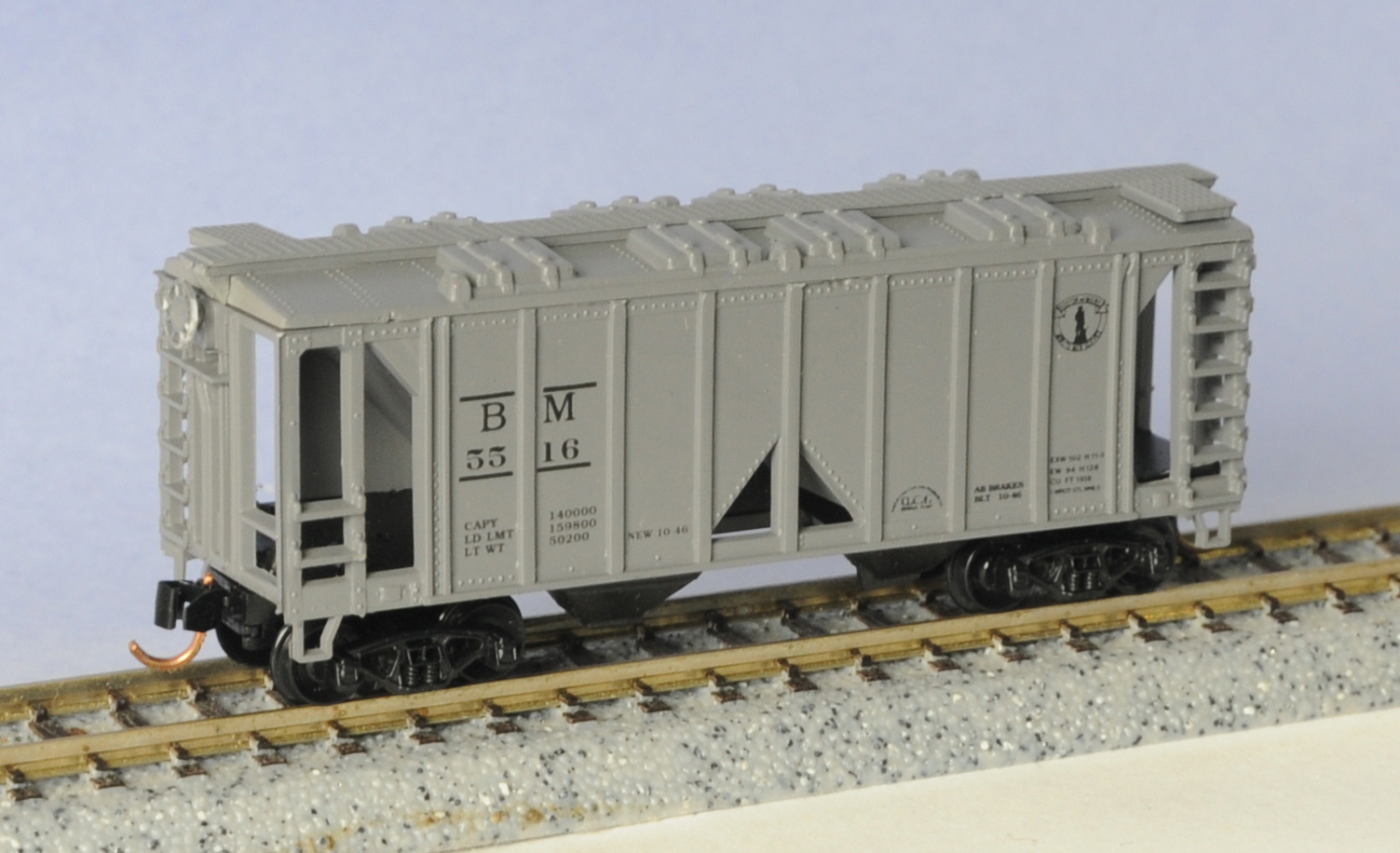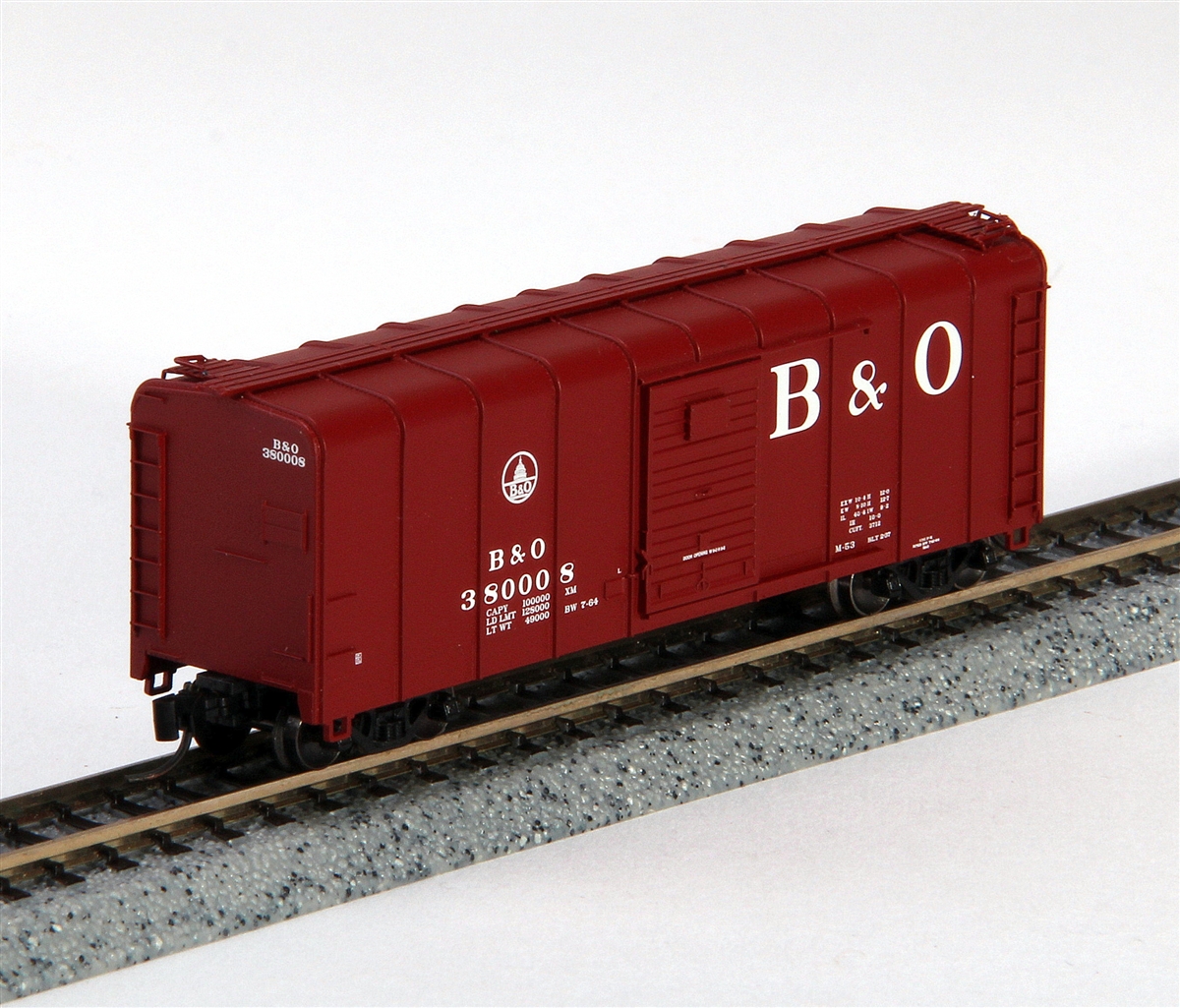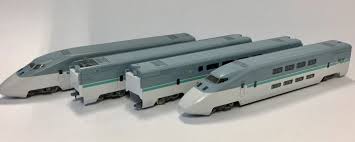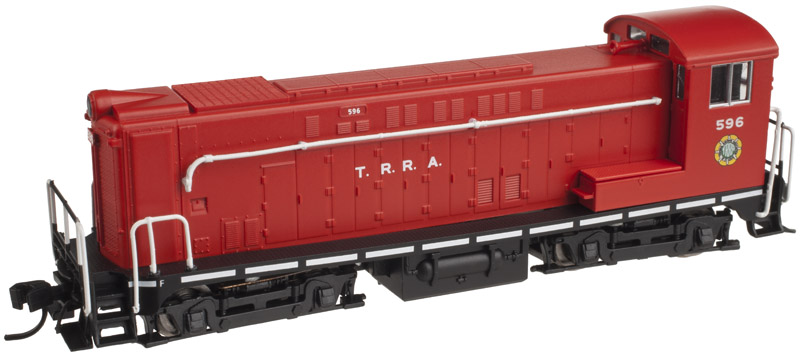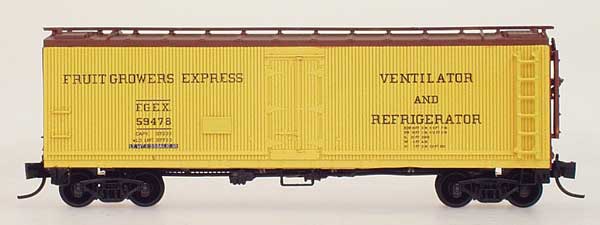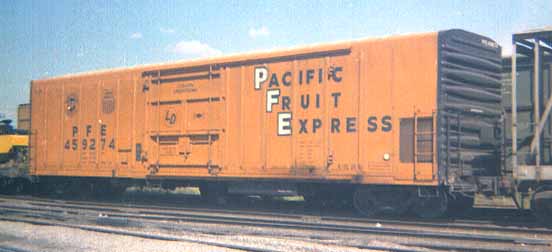Specific Item Information: Only available as part of 5-Pack NSC 00-66: Western Roads Pack #1.
Model Information: Introduced in September of 1983 with ATSF 151900 and 151951, Micro-Trains has produced 83 different versions of this car (as of March, 2016). Body style 027 represents a 50 foot prototype "Plug" single-door Box Car. Unlike the "Sliding" door, the plug door system closes with a final inward movement (similar to most van sliding doors) that seals the door flush with the interior of the boxcar. This provides a much better seal than the sliding door boxcar. A rotating lever on the door activates a gear system to "plug" and "unplug" the door.
Unfortunately for collectors, this means that in order to accurately portray the prototype, this body style does not feature doors that actually open. All other hallmark features of Micro-Trains quality are present. This includes high quality tooling, crisp printing and the ubiquitous knuckle coupler.
Unfortunately for collectors, this means that in order to accurately portray the prototype, this body style does not feature doors that actually open. All other hallmark features of Micro-Trains quality are present. This includes high quality tooling, crisp printing and the ubiquitous knuckle coupler.
Prototype History: While the 40-foot boxcar was a standard design, and it did come in different setups depending on the type of freight being transported, it was not large enough for efficient mass commodity transportation. The 50-foot boxcar made its first appearance in the 1930s and steadily grew in popularity over the years, which further improved redundancies by allowing for even more space within a given car. Today, the 50-footer remains the common boxcar size. After the second world war ended, and steel became once again readily available, steel became the go-to choice for construction of boxcars. Pullman Standard and ACF were some of the most prolific builders of these cars.
These cars came in many variations. For instance, double-doors became practical for large/wide loads, end-doors useful for very large lading such as automobiles, and interior tie-down equipment was helpful in keeping sensitive products from being damaged in-transit. In 1954 the Santa Fe developed its "Shock Control" (and later "Super Shock Control") technology for new boxcars with upgraded suspension systems to further improve the ride-quality and reduce the chance of damaging freight.
In the 1960s, the flush, "plug" style sliding door was introduced as an option that provides a larger door to ease loading and unloading of certain commodities. The tight-fitting doors are better insulated and allow a car's interior to be maintained at a more even temperature.
These cars came in many variations. For instance, double-doors became practical for large/wide loads, end-doors useful for very large lading such as automobiles, and interior tie-down equipment was helpful in keeping sensitive products from being damaged in-transit. In 1954 the Santa Fe developed its "Shock Control" (and later "Super Shock Control") technology for new boxcars with upgraded suspension systems to further improve the ride-quality and reduce the chance of damaging freight.
In the 1960s, the flush, "plug" style sliding door was introduced as an option that provides a larger door to ease loading and unloading of certain commodities. The tight-fitting doors are better insulated and allow a car's interior to be maintained at a more even temperature.
Road Name History: The Atchison, Topeka and Santa Fe Railway (reporting mark ATSF), often abbreviated as Santa Fe or AT&SF, was one of the larger railroads in the United States. Chartered in February 1859, the railroad reached the Kansas-Colorado border in 1873 and Pueblo, Colorado, in 1876. To create a demand for its services, the railroad set up real estate offices and sold farm land from the land grants that it was awarded by Congress. Despite the name, its main line never served Santa Fe, New Mexico, as the terrain was too difficult; the town ultimately was reached by a branch line from Lamy.
The Santa Fe was a pioneer in intermodal freight transport, an enterprise that (at one time or another) included a tugboat fleet and an airline (the short-lived Santa Fe Skyway). Its bus line extended passenger transportation to areas not accessible by rail, and ferryboats on the San Francisco Bay allowed travelers to complete their westward journeys to the Pacific Ocean. The ATSF was the subject of a popular song, Harry Warren & Johnny Mercer's "On the Atchison, Topeka and the Santa Fe", written for the film, The Harvey Girls (1946).
The railroad officially ceased operations on December 31, 1996, when it merged with the Burlington Northern Railroad to form the Burlington Northern & Santa Fe Railway.
Read more on Wikipedia.
The Santa Fe was a pioneer in intermodal freight transport, an enterprise that (at one time or another) included a tugboat fleet and an airline (the short-lived Santa Fe Skyway). Its bus line extended passenger transportation to areas not accessible by rail, and ferryboats on the San Francisco Bay allowed travelers to complete their westward journeys to the Pacific Ocean. The ATSF was the subject of a popular song, Harry Warren & Johnny Mercer's "On the Atchison, Topeka and the Santa Fe", written for the film, The Harvey Girls (1946).
The railroad officially ceased operations on December 31, 1996, when it merged with the Burlington Northern Railroad to form the Burlington Northern & Santa Fe Railway.
Read more on Wikipedia.
Brand/Importer Information: Micro-Trains is the brand name used by both Kadee Quality Products and Micro-Trains Line. For a history of the relationship between the brand and the two companies, please consult our Micro-Trains Collector's Guide.
Manufacturer Information:  Micro-Trains Line split off from Kadee Quality Products in 1990. Kadee Quality Products originally got involved in N-Scale by producing a scaled-down version of their successful HO Magne-Matic knuckle coupler system. This coupler was superior to the ubiquitous 'Rapido' style coupler due to two primary factors: superior realistic appearance and the ability to automatically uncouple when stopped over a magnet embedded in a section of track. The success of these couplers in N-Scale quickly translated to the production of trucks, wheels and in 1972 a release of ready-to-run box cars.
Micro-Trains Line split off from Kadee Quality Products in 1990. Kadee Quality Products originally got involved in N-Scale by producing a scaled-down version of their successful HO Magne-Matic knuckle coupler system. This coupler was superior to the ubiquitous 'Rapido' style coupler due to two primary factors: superior realistic appearance and the ability to automatically uncouple when stopped over a magnet embedded in a section of track. The success of these couplers in N-Scale quickly translated to the production of trucks, wheels and in 1972 a release of ready-to-run box cars.
Micro-Trains Line Co. split off from Kadee in 1990 to form a completely independent company. For this reason, products from this company can appear with labels from both enterprises. Due to the nature of production idiosyncrasies and various random factors, the rolling stock from Micro-Trains can have all sorts of interesting variations in both their packaging as well as the products themselves. When acquiring an MTL product it is very important to understand these important production variations that can greatly enhance (or decrease) the value of your purchase.
Please consult our Micro-Trains Collector's Guide

Micro-Trains Line Co. split off from Kadee in 1990 to form a completely independent company. For this reason, products from this company can appear with labels from both enterprises. Due to the nature of production idiosyncrasies and various random factors, the rolling stock from Micro-Trains can have all sorts of interesting variations in both their packaging as well as the products themselves. When acquiring an MTL product it is very important to understand these important production variations that can greatly enhance (or decrease) the value of your purchase.
Please consult our Micro-Trains Collector's Guide
Commissioner Information: 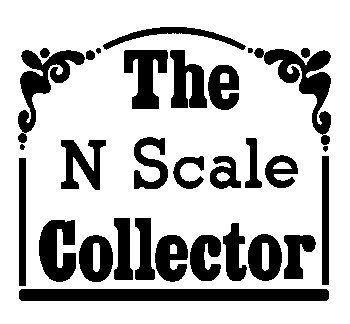 The N Scale Enthusiast Society (previously known as The N Scale Collector until 2011) was established by Wick Brandon, as a sole proprietorship and was a stand alone company until Wick passed away in 2000. The company has been owned by Micro Trains Line since then.
The N Scale Enthusiast Society (previously known as The N Scale Collector until 2011) was established by Wick Brandon, as a sole proprietorship and was a stand alone company until Wick passed away in 2000. The company has been owned by Micro Trains Line since then.
Wick was the founder of TexNRails and he established NSE right after he sold the pioneering N Scale retailer to the Herz family, and the store moved to Florida. Wick and Lea moved their family from Texas to Bakersfield California, and the entire operation was run from his home in Bakersfield. George Johnsen, the current Chairman, came on board as Associate Editor starting with the third issue of the magazine, and the growth of the organization hasn’t stopped. Wick and George did the first convention in Medford in 1993, and added staff and advisors as the organization grew. Wick held the first auction for the NSE in 1995.
The NSE mission statement reads: “This organization is dedicated to the preservation of the history of N Scale Model Railroading, and the railroads they represent.”
They do:
- Special Run Cars
- Regular Auctions of "collectable" Cars
- Annual Conventions
- Bi-Monthly Magazine
Wick was the founder of TexNRails and he established NSE right after he sold the pioneering N Scale retailer to the Herz family, and the store moved to Florida. Wick and Lea moved their family from Texas to Bakersfield California, and the entire operation was run from his home in Bakersfield. George Johnsen, the current Chairman, came on board as Associate Editor starting with the third issue of the magazine, and the growth of the organization hasn’t stopped. Wick and George did the first convention in Medford in 1993, and added staff and advisors as the organization grew. Wick held the first auction for the NSE in 1995.
The NSE mission statement reads: “This organization is dedicated to the preservation of the history of N Scale Model Railroading, and the railroads they represent.”
They do:
- Special Run Cars
- Regular Auctions of "collectable" Cars
- Annual Conventions
- Bi-Monthly Magazine
Item created by: gdm on 2019-11-04 14:04:56. Last edited by klausnahr on 2022-03-27 14:47:53
If you see errors or missing data in this entry, please feel free to log in and edit it. Anyone with a Gmail account can log in instantly.
If you see errors or missing data in this entry, please feel free to log in and edit it. Anyone with a Gmail account can log in instantly.


